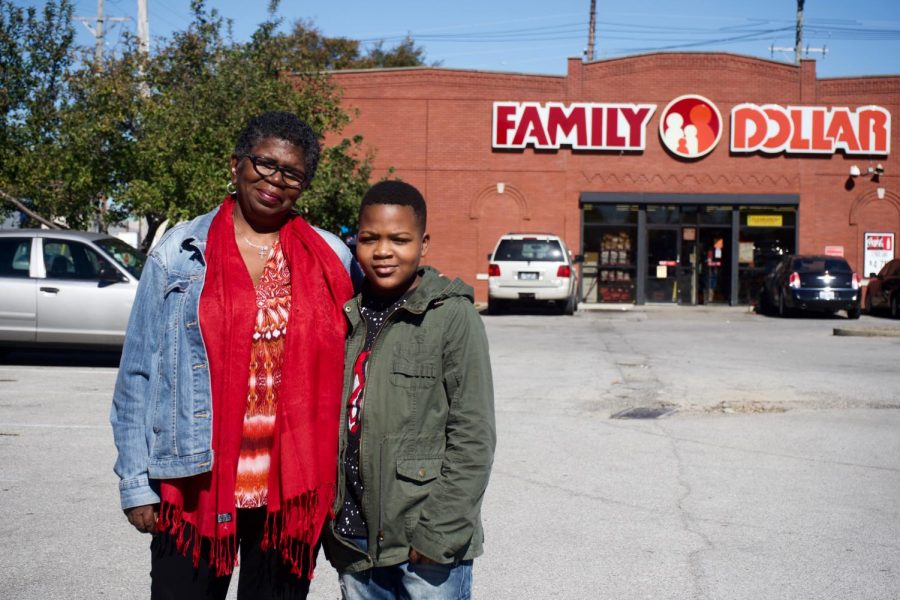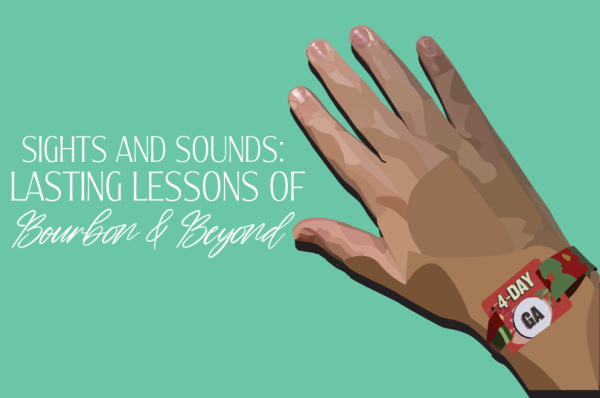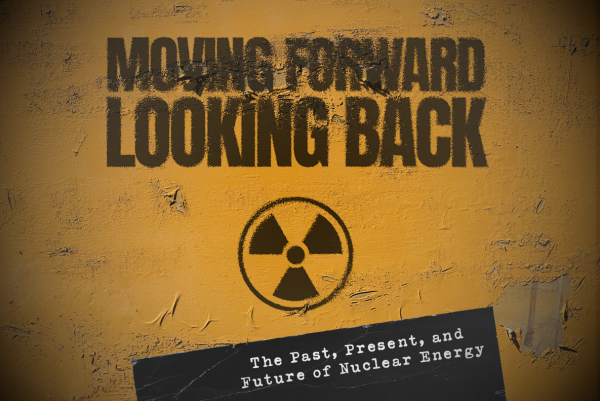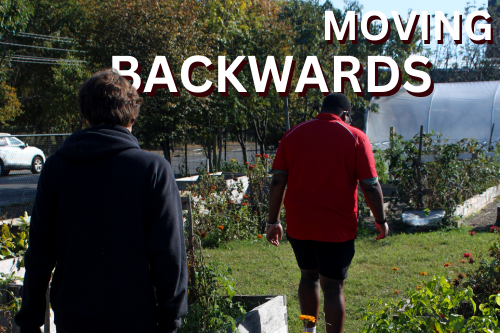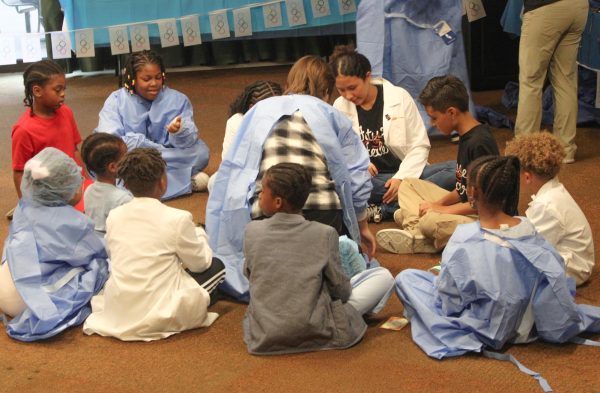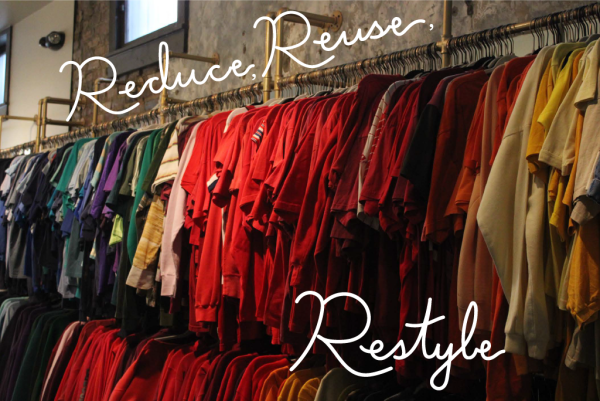Life in Liquor
A community reaches its breaking point after the amount of liquor stores becomes too much to handle.
On Oct. 8, Jackie Floyd stands with her grandson,Shaun Cooksey, outside of a Family Dollar on 15th Street and Market Street that attempted to obtain a liquor license. “Why should the community accept the fact that even more liquor is being put into their community?” Floyd said. Photo by Marshall Gault
On the morning of July 30, Louisville citizens took to the streets, even though it was cloudy and raining, and headed toward the closest Family Dollar to object to the corporation’s application to sell liquor in 23 locations throughout Louisville’s western and southern neighborhoods. Protesters stood in front of the stores with picket signs in hand and a demand for change.
The communities of the West End did not want these 23 Family Dollars to join the 175 stores that already sell alcohol. Of those stores, more than half of them are located west of Ninth Street.
Now, “stores” doesn’t refer to restaurants with a classy wine menu or hotels with a bar in the lobby. In fact, it doesn’t refer to bars at all; it just refers to liquor stores whose sole purpose is to sell alcohol. When Family Dollar submitted those 23 liquor license applications, West End residents decided they’d endured enough.
If you were to walk down the street in the east end, you would find grocery stores with fresh produce, sit-down family restaurants, and coffee shops. If you were to walk in the West End, you might see a liquor store every few blocks, mostly fast food restaurants, and if you’re in the right spot, maybe one of two Kroger locations.
The slew of liquor stores has been a common complaint among West End residents due to the abundance of businesses that sell alcohol. Adding more liquor stores is not ideal when it comes to the revitalization of the neighborhoods because it serves as a continual roadblock for the recuperation of these communities.
Jackie Floyd is the neighborhood liaison for the Center for Neighborhoods, an organization that works toward community engagement and education throughout Louisville — but when it comes to the issue of liquor licenses and alcohol sales, she speaks as a concerned West End resident.
West End residents, including Floyd, find it upsetting that there are more cheap alcohol sales in communities that already struggle with addiction. According to the National Institute of Alcohol Abuse and Alcoholism, there are approximately 88,000 deaths annually due to alcohol abuse. That makes it the third leading lifestyle death in the nation.
So why are businesses increasing the amount of alcohol in these neighborhoods, knowing that people are suffering every day from the amount of alcohol in their communities?
The Center for Disease Control and Prevention stated that there were 1,351 deaths each year in Kentucky due to alcohol abuse between 2006 and 2008. Of the 50 states, Kentucky is the 15th leading state in alcohol death rates per 100,000 people. Furthermore, Louisville has the highest rate of alcohol consumption in the state.
However, Louisville isn’t the only city facing this issue. Underprivileged neighborhoods in cities throughout the Midwest have seen an increasingly heavy presence of liquor stores.
For example, Family Dollar also attempted to introduce alcohol sales into underprivileged neighborhoods in both Dayton and Cincinnati, Ohio.
The Dayton City commission denied the business’ applications, but in Cincinnati, nine locations have received licenses to sell alcohol since September of last year.
To people like Floyd, it’s exhausting to watch businesses receive liquor licenses despite little increase in things like grocery stores and family restaurants.
“Why should the community accept the fact that even more liquor is being put into their community if there is already an abundant amount of places to purchase it?” Floyd said.
There is a drastic gap in economic development that different Louisville groups are striving to fill in order to make it equal across the board, no matter what the five-digit zip code is.
Groups such as OneWest — a local nonprofit focused on bringing investment to West Ends neighborhoods — work to revitalize the West End while maintaining its culture and history. They strive to widen the range of retail goods and services as well as transform the streetscape with significant beautification to attract businesses.
They are also working to increase economic prosperity that will help stabilize the housing market, enhance access to services, improve health and safety, and instill a renewed sense of pride in the West End.
According to their website, OneWest plans to reach these goals with the help of individual donors, foundations, corporate donors, and government sources.
Louisville’s history helps explain why things are still the way they are. The West End of Louisville has been oppressed through redlining, generational and multidimensional poverty for decades. In 1933, the Home Owners Loan Corporation created redlining maps of residential neighborhoods based on their desirability for investment.
Each neighborhood was assigned a letter grade of an “A” through “D”. Predominantly white neighborhoods usually received an “A” or “B”. While, most black, Latinx, and other ethnic groups were given a “C” or “D”, which abolished their chance of having mortgage insurance or credit for decades. To this day, we still have the effects of redlining in the West End. Redlining is largely to blame for Louisville’s ranking as the fourth most segregated city in America.
It’s not as if no one’s ever tried to reduce these lasting effects. They have. It’s just that, oftentimes, revitalization efforts either come up short, or have unintended consequences.
Park DuValle is a prime example of a neighborhood that was renovated and now the houses and streets look completely different; it was somewhat stripped of its historical character.
Many West End residents, like Takoda Coleman, a 16-year-old junior at duPont Manual High School, are worried that the revitalization of these neighborhoods are coming from people who aren’t as knowledgeable about the historical aspects of the areas.
“I hope that one day we can all reach a point to where we can all be on the same page in terms of revitalization,” Coleman said.
If there is no advancement, the rest of Louisville will continue to look at West End neighborhoods as the “poor neighborhoods” of Louisville. Even though neighborhoods are in desperate need of revitalization, they are also at risk of losing their character.
These are problems the West End has been dealing with for years: How does a community balance growth of new businesses with the preservation of history? How can it ensure that new investment will affect residents in a positive way?
There aren’t easy answers to those questions, but on Sept. 28, West End residents saw a change for the better. More specifically, 23 Louisville Family Dollar locations received letters from the Department of Codes and Regulations, informing them that their liquor license requests had been denied.
The reason? Community protests. Residents said they didn’t want more alcohol in their neighborhoods, and the city listened. Of course, for every case of an establishment failing to obtain a liquor license, there are plenty cases of businesses succeeding. However, protesters who were against the Family Dollars selling liquor saw their voices make a direct impact, and to them, that’s a step in the right direction. •
Donations are collected through The Publishers, duPont Manual High School's booster club for J&C. On The Record relies completely on sponsorships, advertisements, and donations to produce and distribute each issue. Please consider donating to our cause, and helping the student journalists of OTR amplify youth voices for years to come.


